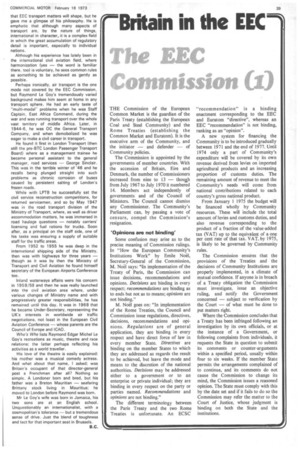Britain in the EEC,
Page 41

If you've noticed an error in this article please click here to report it so we can fix it.
THE Commission of the European Common Market is the guardian of the Paris Treaty (establishing the European Coal and Steel Community) and the Rome Treaties (establishing the Common Market and Euratom). It is the executive arm of the Community, and the initiator — and defender — of Community policies.
The Commission is appointed by the governments of member countries. With the accession of Britain, Eire and Denmark, the number of Commissioners increased from nine to 13 — thoush from July 1967 to July 1970 it numbered 14. Members act independently of governments and of the Council of Ministers. The Council cannot dismiss any Commissioner. The Community's Parliament can, by passing a vote of censure, compel the Commission's resignation.
'Opinions are not binding'
Some confusion may arise as to the precise meaning of Commission rulings. In "How the European Community's Institutions Work" by Emile Noel, Secretary-General of the Commission, M. Noel says: a'kin implementation of the Treaty of Paris, the Commission can issue decisions, recommendations and opinions. Decisions are binding in every respect; recommendations are binding as to ends but not as to means; opinions are not binding."
M. Noel goes on: "In implementation of the Rome Treaties, the Council and Commission issue regulations, directives, decisions, recommendations and opinions. Regulations are of general application, they are binding in every respect and have direct force of law in every member State. Directives are binding on the member States to which they are addressed as regards the result to be achieved, but leave the mode and means to the discretion of the national authorities. Decisions may be addressed either to a government or to an enterprise or private individual; they are binding in every respect on the party or parties named. Recommendations and opinions are not binding."
The different terminology between the Paris Treaty and the two Rome Treaties is unfortunate. An ECSC "recommendation" is a binding enactment corresponding to the EEC and Euratom "directive", whereas an EEC "recommendation" is not binding, ranking as an "opinion".
A new system for financing the Community is to be introduced gradually between 1971 and the end of 1977. Until 1974 only a part of Community's expenditure will be covered by its own revenue derived from levies on imported agricultural products and an increasing proportion of customs duties. The remaining amount of revenue to meet the Community's needs will come from national contributions related to each country's gross national product.
From January 1 1975 the budget will be financed wholly by Community resources. These will include the total amount of levies and customs duties, and also revenue corresponding to the
product of a fraction of the value-added tax (VAT) up to the equivalent of a one per cent rate of that tax. VAT, by 1975, is likely to be governed by Community rules.
The Commission ensures that the provisions of the Treaties and the decisions of Community Institutions are properly implemented, in a climate of mutual confidence. If anyone is in breach of a Treaty obligation the Commission must investigate, issue an objective ruling, and notify the Government concerned — subject to verification by the Court — of what must be done to put matters right.
Where the Commission concludes that a Treaty has been infringed following an investigation by its own officials, or at the instance of a Government, or following complaints from individuals, it requests the State in question to submit its comments or counter-arguments within a specified period, usually within four to six weeks. If the member State permits the arrangements complained of to continue, and its comments do not cause the Commission to change its mind, the Commission issues a reasoned opinion. The State must comply with this by the date set and if it fails to do so the Commission may refer the matter to the Court of Justice, whose judgment is binding on both the State and the institutions.












































































































